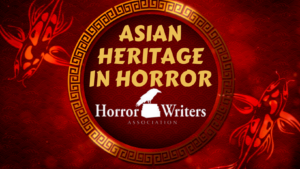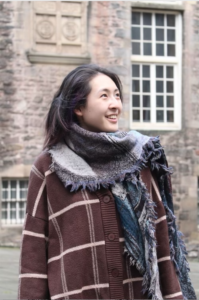Asian Heritage in Horror: Interview with Ai Jiang

 Ai Jiang is a Chinese-Canadian writer, an immigrant from Fujian, and an active member of HWA. Her work has appeared or is forthcoming in F&SF, The Dark, PseudoPod, Jellyfish Review, Hobart Pulp, The Masters Review—among others. Find her on Twitter (@AiJiang_) and online (http://aijiang.ca).
Ai Jiang is a Chinese-Canadian writer, an immigrant from Fujian, and an active member of HWA. Her work has appeared or is forthcoming in F&SF, The Dark, PseudoPod, Jellyfish Review, Hobart Pulp, The Masters Review—among others. Find her on Twitter (@AiJiang_) and online (http://aijiang.ca).
What inspired you to start writing?
When I was younger, I was drawn to the fantastical romances I could never live, and so I started writing what I had imagined love and relationships would be like during earlier years in high school and found myself on Wattpad. But I left writing aside when I discovered love wasn’t quite like what I imagined it to be and lost passion in what I was writing—though I never lost passion or the love for reading. In terms of what inspired me to write the things I do now—predominantly horror and dark fantasy—I’d say it was a combination of specializing in literature for my undergraduate degree and watching movies like Us, Get Out, Parasite, and Shutter Island, along with reading works by Shirley Jackson, Toni Morrison, Ursula K. LeGuin, and Kazuo Ishiguro that got me into reading more literary speculative fiction, and what eventually inspired me to begin writing it. I loved the fast paced, plot driven works I read outside of the authors I’ve mentioned above, but I loved the character-driven, atmospheric, metaphoric, philosophical, and reflective works much more. And I wanted to reconcile my love for both these things through writing, though I do think my work seems to stray more to the quiet, and perhaps rhythmic, side in terms of tone and style.
What was it about the horror genre that drew you to it?
I am drawn most to psychological horrors, which I find is a sub-genre that unsettles me, lingers within my mind long after reading and long after the story has settled. There is something intensely immersive about horrors that prod at our deepest fears, anxieties, worries. Sometimes the silent horrors are the most frightening of all. And sometimes the loudest horrors are the ones we hold inside, when we don’t let our screams and thoughts escape—a downwards spiral we allow to happen only because we don’t know how else to cope. Through the horrific, dreadful, and perhaps suspenseful experiences that I become immersed with while reading horror, I find myself becoming more reflective about my own fears and worries, and also think further about the world and its people—the nature of humanity, existence itself.
Do you make a conscious effort to include Asian Diaspora characters and themes in your writing and if so, what do you want to portray?
I don’t think I necessarily make a conscious effort to include Asian Diaspora characters, but I find that they naturally make up a large portion of my story characters. Given I tap into my own fears and anxieties while writing, along with my life experiences and family background, every story and character has a piece of me. And more often than not, the characters may resemble an aspect of me—perhaps not physically but psychologically—in some shape or form. Often when I include Asian Diaspora characters and themes in my writing, I portray a sense of fragmentation, loss, homelessness in the sense that what is our home now may not always feel truly home. I portray the desire to belong, the desire to be not “Other”, but also the conflicting mindset of also wanting to be unique and different—but not different.
What has writing horror taught you about the world and yourself?
I think one of the biggest things horror has taught me is that though I fear change, I also desire it; and though sometimes I feel whole, I’m far more fractured than I realize; and though the world seems bleak at moments, sometimes humanity and hope does win even amidst the chaos. As much as people might believe at times, we are not the only ones experiencing the fears and anxieties we have. Horror, I think, is something that can bring people together, but it can also be something that tears people apart both physically and mentally.
How have you seen the horror genre change over the years? And how do you think it will continue to evolve?
I think the genre’s become much more diverse, inclusive, but also experimental in the most wonderful sense. And I hope to see more writers moving away from traditional linear timelines and perspectives and successfully executing them. I think sub-genres of horror might continue to expand and evolve, much like how it has been with science fiction. It seems that horror is also trending and currently on the rise, so I’m keen to see how it might grow further in the next few years as newer writers bring their voices into current conversations!
How do you feel the Asian community has been represented thus far in the genre and what hopes do you have for representation in the genre going forward?
Particularly in Western horror, I’ve noticed that Asian communities are often represented as foreign cultures and the Other who bring about horror into the Western world or by stepping into the threshold of such communities, they are entering an uncanny or sinister world. I hope to see a different lens, where Asian communities and their culture, religion, or folklore is not always antagonized. But I’d like to also see more horror both written and on screen by Asian communities that is more fore fronted at the global stage.
Who are some of your favorite Asian characters in horror?
I’ve always had a soft spot of zombie horror movies, and I must say Train to Busan is one of my favourites if not the favourite. The protagonist of the movie, Seok-Woo played by Gong Yoo is my favourite character, hands down. Two others include Seo Yi-Kyeong played by Lee Si-young in Sweet Home, and Prince Yi Chang played by Ju Ji-hoon in Kingdom—both series are unironically also apocalyptic horror. But what this made me realize is I haven’t read a full-length horror novel by a Chinese writer, and I’m hoping that will change.
Who are some Asian Diaspora horror authors you recommend our audience check out?
A few among many include L Chan, Cassandra Khaw, Elaine Cuyekeng, and Yi Izzy Yu.
What is one piece of advice you would give horror authors today?
Don’t discount the horrors of others, I’d say—what one might horrific another might now, but that doesn’t make one’s personal horror any less valid. Writing and art is subjective after all, and I think so is horror.
And to the Asian writers out there who are just getting started, what advice would you give them?
Read and speak to others in the community—as dark as our words may be, most of us are very kind and uplifting, I promise! Given that we don’t make up much of the community in number—though I can see this slowly changing!—don’t be afraid of putting yourself out there, hustling to get eyes on your words, wanting to be read even if you fear sharing that vulnerability. Our stories matter.



